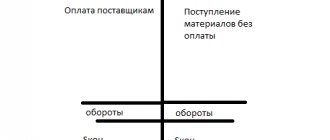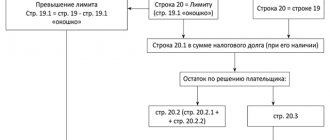State control over money circulation
Changes made to the procedure for cash and non-cash payments in 2021
State control over cash transactions of legal entities
Exclusion from control over the exchange of banknotes
Control of transactions on accounts and deposits
Specifics of changes in control over transactions with movable property
Control over payments for real estate
Changes in operations under state defense orders
At the beginning of 2021, amendments and additions have been made to the Federal Law of August 7, 2001 No. 115-FZ “On Combating the Legalization (Laundering) of Proceeds from Crime and the Financing of Terrorism.” The changes concern cash and non-cash payments, which are subject to mandatory control.
Let's look at the main innovations and give examples of documents confirming the legality of controlled transactions.
Working with cash in 2021
Please note that the new rules for cash payments still limit the amount of payments to 100,000 rubles per contract. Similar to previous years, entrepreneurs have the opportunity to pay wages to employees, make payments to individuals, and also spend cash on personal needs.
By and large, the movement of cash is regulated in accordance with the previous Directive of the Bank of Russia dated December 9, 2019 No. 5348-U, which came into force in April 2021. As well as some items on the circulation of cash, which are related to the fight against criminal and terrorist activities, are regulated by a nationwide law dated August 2001. For example, the seventh article of this document talks about:
- requirements that apply to a legal entity when concluding contracts involving funds, including cash payments;
- powers of enterprises if necessary to counter criminal and terrorist activities, taking into account the control of cash payments.
The basic points when paying in cash in 2021 are still:
- the presence of a limit on the amount of mutual settlements using paper and metal cash with the participation of organizations, individual entrepreneurs that are officially registered as entrepreneurs;
- entrepreneurs and corporations in 2021 can legally spend cash from the cash register on settlement transactions.
Ban on cash payments in Russia under Law No. 44-FZ
Let us turn to the text of Art. 34 of the Law “On the contract system in the field...” of 04/05/2013 No. 44-FZ (hereinafter referred to as Law No. 44-FZ), which determines the contract price. It does not say that payments in cash within the framework of these legal relations are prohibited.
Moreover, paragraph 15 of Art. 34 provides that the requirements for a fixed price and the form of the agreement may not apply if, for example, it is an agreement with a single supplier. Based on this, we can conclude that cash payments with a single supplier can be used in 2 cases:
- When concluding a contract, the amount of which does not exceed 100,000 rubles. (Clause 4, Part 1, Article 93 of Law No. 44-FZ).
- When signing an agreement, the amount of which does not exceed 400,000 rubles, for some organizations in accordance with clause 5 of part 1 of art. 93 of Law No. 44-FZ (for example, physical education and sports).
In all other cases, cash payments are not allowed.
What are the penalties for exceeding limits?
Let's talk about possible penalties that may be imposed on an entrepreneur or enterprise. If you exceed the limits for cash payments, be prepared to pay the following amounts, regulated by Article 15.1 of the Code of Administrative Offenses of the Russian Federation:
- Individual entrepreneurs will be fined in the amount of 4,000 to 5,000 rubles;
- Violating limits will cost businesses and organizations significantly more. Fines imposed range from 40,000 to 50,000 rubles.
It is worth clarifying that tax inspectors have the opportunity to impose fines only within two months (three when the case is considered by a judge) from the date of payment exceeding the settlement limit. In addition, do not forget that a fine can be imposed on both parties: both the one paying and the one receiving the payment.
Let's look at an example:
Let's say the buyer is an individual entrepreneur and is going to purchase equipment for his enterprise from an organization. The organization does not have the right to accept from an entrepreneur an amount exceeding one hundred thousand rubles in one transaction, as this is prohibited by law. Otherwise, a fine may be imposed on both the seller and the buyer.
As before, the new rules include a limitation clause regarding the amount of cash payments in 2021 between direct organizations, entrepreneurs, as well as between LLCs and individual entrepreneurs. Under one agreement, this clause provides for payments only up to 100,000 rubles. This includes settlement of expired transactions in which one of the parties will pay debt obligations.
Note!
Even if the settlement is exceeded by only 10 rubles, the transaction will be considered illegal.
For any amount exceeding the limits, the manager and the payer may receive a fine. To avoid penalties, we advise you to divide the payment into two or more payments, which will not exceed the maximum established by law. At the same time, you should know that settlement transactions with individuals, self-employed people who do not have the status of an entrepreneur, as well as cash withdrawals for personal expenses do not provide for limits and restrictions.
Why acquiring is good
Firstly, you will attract more clients. People who pay with plastic cards often have a good income. They choose stores and services that are convenient for them, where there is the possibility of cashless payments. Secondly, sales revenue will increase, customers will be able to make purchases freely. In addition, as scientists from the United States say, people part with electronic money much easier, since they do not physically hold them in their hands. Thirdly, to some extent you will save on collection costs.
Submit reports in three clicks
Elba - online accounting for small businesses. The service is easy to understand; it prepares reports and calculates taxes itself. There are integrations with banks and online cash registers.
Try 30 days free Gift for new entrepreneurs A year on “Premium” for individual entrepreneurs under 3 months
How to connect payment using plastic cards
First, you will need to select an acquiring bank or intermediary that will provide this service. When choosing a suitable company, study the proposed terms of cooperation and choose the most profitable ones for yourself.
You should pay attention to the following advantages:
- small commission - as a rule, the commission is charged as a percentage of each payment made. A commission of 7% is already a lot, the optimal would be no more than 3-4%, but you can find less;
- the ability to open a current account in the bank that you have chosen - some large processing companies, such as Assist, strictly determine the list of banks in which an account can be opened to accept payments;
- acceptance of the most common bank cards: VISA and MasterCard - this is the minimum set;
- the period during which the money will arrive in your current account - the sooner the better. If no later than the next working day, then the conditions are good;
- cost of services - most companies and banks do not charge a connection fee;
- absence of a security deposit in the account - if this condition is mandatory, then you will be forced to keep an untouchable amount of money in the account, which the bank can write off under any circumstances.
After you decide on a service provider, you need to enter into an agreement for the provision of acquiring services , which will define all the terms of service. After submitting the necessary documents, the bank will register you.
Pos terminals and other equipment for accepting card payments are usually provided and installed by the company with which you enter into an agreement. They often provide consumables, stickers with information about accepting payment cards, and train the cashier to work with the POS terminal. In addition, you will be provided with reports on completed transactions, as well as consultations if difficulties arise in your work.
Cash payment for individual entrepreneurs and organizations
Individual entrepreneurs have the right to make payments in cash received in the following ways:
- funds received from trade in goods;
- cash received in payment for the performance of work or provision of services;
- insurance payments received by the entrepreneur;
- payment made under an agreement for loans from microfinance organizations, pawnshops, credit agricultural cooperatives, etc.;
- funds received in the form of shares of consumer cooperatives;
- return of the amount of debt obligations under an agreement with a credit institution.
Cash payments between legal entities and individual entrepreneurs are carried out using money received at the cash desk from a bank account. Let's figure out what purposes entrepreneurs and organizations use cash for. They have the right to spend funds for the following purposes:
- payment of wages and social benefits to company employees;
- payment of insurance costs to individuals;
- spending cash for personal needs of the entrepreneur that are not related to the company’s activities;
- payment for purchased products, work and services performed (not taking into account the purchase of shares and bonds);
- accountable cash disbursement to employees;
- the amount of return to the buyer for the purchase of goods, payment for work and services, if a return is requested;
- issuing cash for transactions as a bank payment agent.
Other innovations
Informing Rosfinmonitoring
Clause 4 of Art. 6 of Law No. 115-FZ provides a list of types of organizations and a list of transactions performed by them, which should be reported to Rosfinmonitoring from 01/10/2021.
For example, these are credit organizations, professional participants in the securities market, insurance organizations (with the exception of medical insurance organizations operating exclusively in the field of compulsory health insurance) and insurance brokers, leasing companies, federal postal organizations - and this is not a complete list.
Tightening internal control rules
In paragraph 3 of Art. 7 of Law No. 115-FZ clarifies the provision regarding the obligation of organizations to inform the authorized body about suspicions of legalization (laundering) of criminal proceeds that arose as part of the implementation of internal control rules.
According to these clarifications, if employees of an organization carrying out transactions with cash or other property, during internal control, suspect that any one-time operation or a set of operations and (or) actions of the client related to the conduct of any operations, his representative within the framework of customer service, are carried out for the purpose of legalization (laundering) of proceeds from crime or financing of terrorism, this organization no later than three working days following the day of detection of such transactions and (or) actions is obliged to send information about such operations. This information includes available information about the beneficial owner. These changes came into force on 03/01/2022.
Ways to receive cash
Entrepreneurs and organizations receive cash in several ways:
- Receiving cash when paying through cash register equipment. At the moment, the presence of an online cash register is mandatory for all organizations selling goods and services (except for some types of individual entrepreneurs that have received a temporary deferment).
- Cash received through strict reporting forms, payment according to details, or without the use of cash register equipment for certain categories of services, for example, when paying for travel on public transport, selling newspaper products to trade at markets and trade fairs.
Don't forget to issue a cash receipt
Internet acquiring does not exempt you from online checkout. For any receipt from customers, entrepreneurs are required to issue cash receipts. To figure out whether you need to use an online cash register and how to work with it, read our free course.
In KUDiR, income from Internet acquiring is taken into account by the bank.
Important note: Income will be the entire amount paid by the client, without deducting the amount of bank commission. If you apply the simplified tax system “Income minus expenses”, then you can later take into account the bank commission in expenses.
New cash payments from microfinance organizations, pawnshops and credit cooperatives
This type of organization has the ability to direct cash from the cash desk to issue loans, as well as return received loans, taking into account accrued interest. Let's consider the limits in these areas:
- Micro financial organizations and pawnshops can issue and accept loans, interest payments, fines, penalties and penalties, with a limit of up to 50,000 rubles per agreement. And also up to 1 million per day for each individual office of the organization.
- Credit cooperatives can issue and accept loans under an agreement on the transfer of personal funds, interest payments, penalties and fines in amounts up to 100,000 rubles per agreement. And also with a limit of up to 2 million rubles daily per one division of the organization.
Cash register
The main condition when working with cash is proper fiscalization. That is, it is important for the state and the tax inspectorate that the organization pays taxes on all funds received at the cash desk. If payments are made in non-cash form, tracking the movement of funds is very simple - through the databases of credit institutions. And for cash payments, information about revenue must be reflected using cash documents. That is why all organizations must use cash registers when carrying out their activities. But there are exceptions. The legislation allows not to use cash registers in the following cases:
- The company is on UTII (at the same time it issues analogues of checks to customers, which reflects the fact of payment);
- If it is possible to issue strict reporting forms instead of cash receipts;
- When providing various services to the population;
- If business entities are located in remote locations;
- When carrying out certain types of activities, such as selling magazine products, etc.
Organizations and entrepreneurs with cash register equipment must have documents such as special reports, a cash register and a contract with the technical center. service.
Conclusion
The cash payment rules that came into force in 2021 remain in effect in 2021. Most provisions remained without any changes. Similar to previous years, individual entrepreneurs can pay wages to employees, make payments to individuals, and also spend cash on personal needs. The limits on cash payments remained unchanged, as well as the fines that are provided for violating the adopted restrictions.
Do you need to open a current account for an individual entrepreneur?
Don’t waste time, we will provide a free consultation and help you open a current account on the most favorable terms.
Settlements under a letter of credit
1. Settlements under a letter of credit (from the French accreditif, Latin ad credere - authority) is a form of payment in which the bank, on behalf of the client (payer) to open a letter of credit, undertakes to make payments in favor of the recipient of the funds upon presentation of the documents provided for by the terms of the letter of credit (Clause 1 of Article 867 of the Civil Code).
In addition to the transfer of funds, the execution of a letter of credit may consist of payment, acceptance or discounting of a bill of exchange. The corresponding actions can be carried out either by the payer's bank (issuing bank, from the Latin emitto - to issue), or by another bank (executing bank).
Opening a letter of credit consists of allocating (separating) funds from which payments will be made, which provides the recipient with payment guarantees.
At the same time, the letter of credit form of payment also provides protection to the payer, since payment to the recipient of funds is made only after submitting to the bank documents confirming execution under the main contract (for example, supply of goods, performance of work, etc.).
In these conditions, a letter of credit is extremely in demand when making payments in conditions of a high risk of non-payment, the absence of established business relations between counterparties, as well as when the costs associated with debt collection are significant. Therefore, the letter of credit form of payment is widely used in foreign trade transactions.
The list of documents, the provision of which by the recipient is necessary to make a payment in his favor, is established by the payer when opening a letter of credit. At the same time, the bank, based on external signs, checks the documents for their compliance with the terms of the letter of credit, but does not investigate the issue of the actual execution of the agreement by the recipient of the funds.
2. A revocable letter of credit (Article 868 of the Civil Code) can be changed or canceled (cancelled) without prior notification to the recipient of funds and without creating any obligations of the issuing bank (payer bank) to it. In accordance with current legislation, a letter of credit is assumed to be revocable, unless otherwise indicated in its text (clause 3 of Article 868 of the Civil Code).
Changing or canceling an irrevocable letter of credit (Article 869 of the Civil Code) without the consent of the recipient of funds is impossible.
A confirmed letter of credit is an irrevocable letter of credit, under which the executing bank, along with the issuing bank, assumes the obligation to make payment, regardless of the receipt of funds from the latter. A confirmed irrevocable letter of credit cannot be canceled without the consent of not only the recipient of the funds, but also the executing bank (clause 2 of Article 869 of the Civil Code). A confirmed letter of credit gives the recipient of funds additional guarantees of payment.
Covered (deposited) letter of credit - a letter of credit, the terms of which provide for the transfer of the amount of the letter of credit (covering) to the executing bank at the expense of the payer or at the expense of the loan provided to him by the issuing bank (if there are no funds in the account in the required amount). A covered letter of credit can be used in the absence of a correspondent relationship between the issuing bank and the nominated bank.
In case of an uncovered (guaranteed) letter of credit, the executing bank has the right to write off the amount of the letter of credit from the correspondent account of the issuing bank, which then reimburses them at the expense of the payer.
From an economic point of view, an uncovered letter of credit is a form of short-term lending.
3. Payment under a letter of credit is made when the recipient of funds submits to the bank documents confirming the fulfillment of the terms of the letter of credit, during its validity period (as well as within the period for submitting documents provided by the letter of credit).
If documents do not comply with the terms of the letter of credit (for example, when submitting an uncertified copy of a document, whereas according to the terms of the letter of credit it must be certified; submitting documents in a smaller number of copies, etc.), the executing bank has the right to refuse to accept them and not make payment, immediately notifying about this by the recipient of funds and the issuing bank (clause 1 of Article 871 of the Civil Code).
In this case, the issuing bank conveys the specified information to the payer, who can give an order for payment, despite the incorrect execution of documents, if the obligation under the main agreement was fulfilled by the recipient of the funds.
The recipient of funds has the right to re-submit the documents provided for by the terms of the letter of credit before its expiration.
The costs of making a payment, which are borne by the executing bank, must be compensated to it by the issuing bank, and to the latter, in turn, by the payer (clause 2 of Article 870 of the Civil Code).
If the executing bank makes a payment in violation of the terms of the letter of credit, the issuing bank may refuse to reimburse the amounts paid (under an uncovered letter of credit) or demand the return of coverage under a covered letter of credit. In this case, an incorrect payment may be recovered by the executing bank from the recipient of funds as unjust enrichment (Articles 1102, 1107 of the Civil Code)1.
A letter of credit can be closed upon expiration of its term, upon cancellation of a revocable letter of credit, as well as upon refusal of the recipient of funds to use the letter of credit (Article 873 of the Civil Code).
4. As a general rule, the issuing bank is responsible for violation of the letter of credit to the payer, and the executing bank is responsible to the issuing bank (clause 1 of Article 872 of the Civil Code). In this case, the payer is responsible to the recipient of funds for failure to fulfill the main obligation; the fact that banks and even the recipient of funds violates the terms of the letter of credit does not relieve the payer from the obligation to make payment under the main agreement.
At the same time, if the executing bank unreasonably refuses to pay funds under a covered or confirmed letter of credit, liability to the recipient of the funds may be assigned to the executing bank.
If the executing bank makes an incorrect payment of funds under a covered or confirmed letter of credit, liability to the payer may be assigned to the executing bank.
You might also be interested in:
Online cash registers Atol Sigma - how to earn more
How to make a return to a buyer at an online checkout: step-by-step instructions
MTS cash desk: review of online cash register models
Scanners for product labeling
Shoe marking for retail 2021
Online cash register for dummies
Did you like the article? Share it on social networks.
Add a comment Cancel reply
Also read:
Water labeling in 2021
Water labeling started as part of the experiment on April 1, 2020.
The pilot project will last until June 1, 2021. We will tell you how the experiment is going, what water is subject to labeling and what entrepreneurs can expect in the near future. Registration in the Chestny Znak marking We provide assistance with registration in the Chestny Znak marking system from 1 day - benefit of 1,500 rubles. Read more about the proposal Experiment on labeling packaged… 398 Find out more
How to choose a label printer
How to choose a label printer for a store and why is it needed?
In cases where goods arrive at a retail outlet without barcodes or marking codes applied, they must be assessed and identified before sale. It is for these purposes that a label printer is supposed to be used in a store - a machine that prints labels, price tags, tags, barcodes, etc. Since last year, this… 307 Read more
Data collection terminal for marking
The data collection terminal for labeling is used when reading Data Matrix codes from the packaging of goods controlled by the Chestny ZNAK system.
The device is a mini-computer and a barcode scanner - “two in one”. The device allows you to read codes on the sales floor, during inventory, and warehouse operations. Data collection terminal at low prices A large selection of data collection terminals from the most popular manufacturers of cash register equipment at low prices... 910 Find out more
From the history of non-cash money...
The very first virtual payment system was installed in the UK. There, non-cash payments were carried out using checks and bills. Since 1775, clearing houses emerged - special interbank organizations that carried out non-cash settlements on checks and other payment documents by offsetting mutual claims. Members of clearing houses accepted checks drawn on any bank for payment. The checks were then sent to clearing houses, where they were sorted and cleared several times a day.
In Austria, Belgium, Hungary, Germany, Holland, France, Italy, Switzerland, giro payments prevailed - non-cash payments that first passed through specialized giro banks, and only then went to banks and cash desks. That is, the calculations were carried out on the basis of endorsement orders - written orders for the transfer of funds from one account to another.
Already in the seventies, an electronic payment acceptance system appeared in some countries. At that time, so-called telegraph transfers became widespread.
Data protection
Nowadays, almost all non-cash payments are made online, using various Internet banking systems. The convenience of working in this format also has a downside: if criminals gain access to the account, the businessman could seriously suffer.
To avoid such problems, you should follow the rules:
- Restrict access to the computer from which you work with the bank. Ideally, it should not be used for any other purpose.
- In case of access to the “banking” computer by persons not authorized to work with the account (for example, IT specialists during setup), carefully monitor their actions.
- Check your computer regularly (at least once a week) for viruses.
- Regularly change your operating system login passwords. Store all passwords on separate media (flash drives) located in a safe. Under no circumstances should you write down passwords on your computer’s hard drive.
- If any employee who had access to online banking is fired, all passwords should be changed immediately.
Cash payments up to 100 thousand rubles.
The first method is cash payments in rubles and the currencies of other states among participants (legal entities and individual entrepreneurs) of cash payments within the limits of exclusively one agreement, which they have the right to make in an amount not exceeding 100 thousand rubles, or in the currency of another state , equivalent to 100 thousand rubles. at the official exchange rate of the Bank of Russia on the date of these payments.
Cash payments up to 100 thousand rubles. are made upon fulfillment of the obligations assumed, determined by the agreement signed by the parties to cash payments and valid both during the validity and after the expiration of the agreement
Guided by the Directives dated October 7, 2013 N 3073-U
It follows that if there are several agreements with different organizations, then with each separately you can make payments in cash within the limits established by the Central Bank of the Russian Federation.
For example, enterprise A entered into an agreement for the supply of goods with enterprises B in the amount of 500 thousand rubles, C in the amount of 400 thousand rubles, D in the amount of 300 thousand rubles. During the day, enterprise A can make cash payments of up to 100 thousand rubles. with every. The remaining amount under the three contracts is paid by bank transfer.
In the case of signing two, three or more agreements with the same company on different subjects of the agreement, cash payments are also made within the limits specified by Instructions dated October 7, 2013 No. 3073-U
, i.e. under each agreement you can pay in cash up to 100 thousand rubles.
Based on the meaning of the Directives of the Central Bank of the Russian Federation “On making cash payments”, when concluding several contracts with the same enterprise, for the same subject of the contract, payment in cash in the amount of 100 thousand rubles. can only be carried out under one of these agreements.









